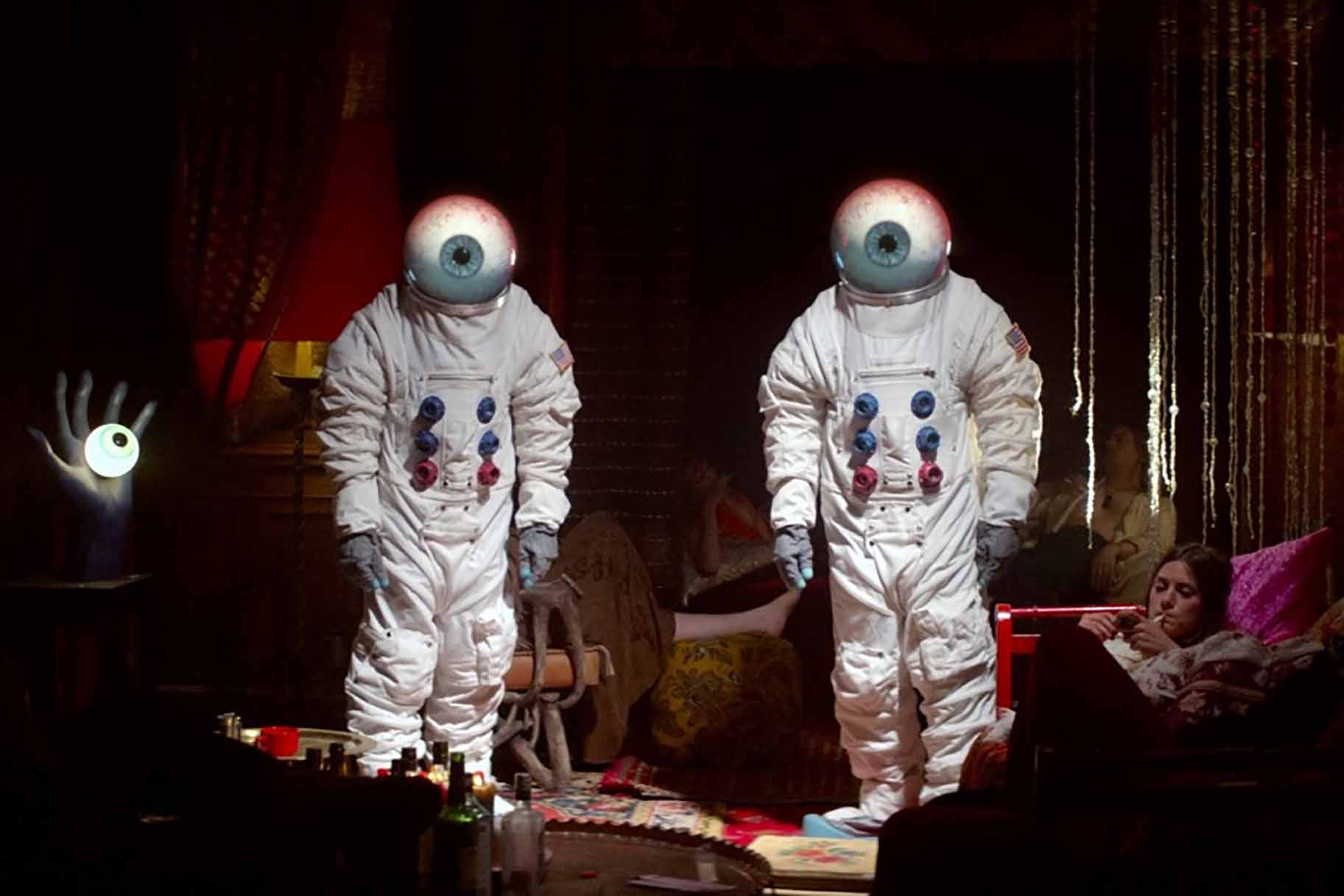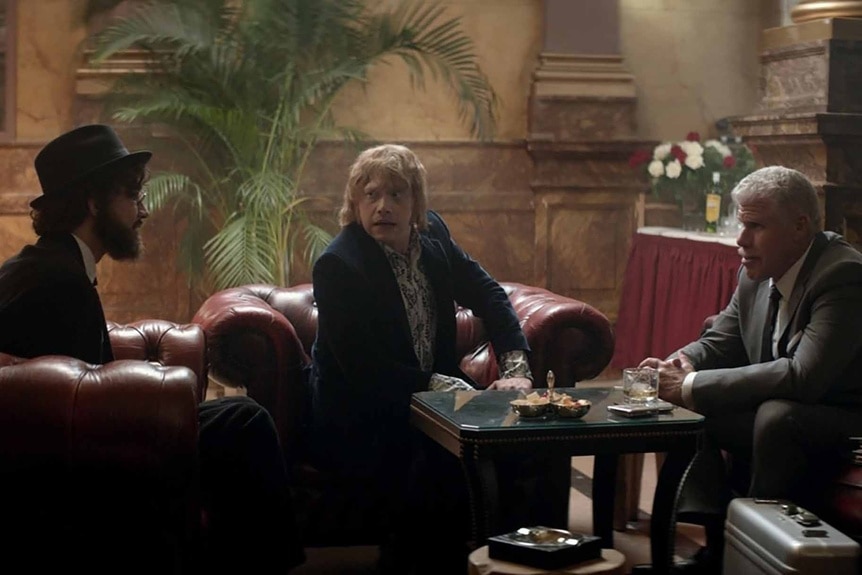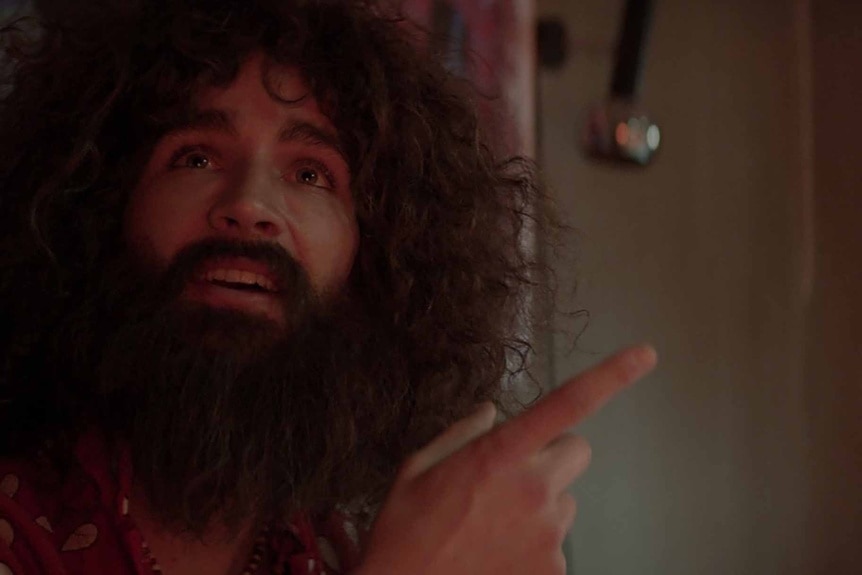Create a free profile to get unlimited access to exclusive videos, sweepstakes, and more!
How Moonwalkers Writer Hoped to Lampoon Insane Conspiracy Theories: "Truth Is Really Precious"
In the age of QAnon and adrenochrome, Moonwalkers has never felt more relevant.

In an age where people fervently believe in QAnon, adrenochrome harvesting, and scaly reptilian overlords, a film like Moonwalkers (2015) has never felt more relevant. Now streaming on Peacock for the very first time, the psychedelic satire helmed by Antoine Bardou-Jacquet tackles the famous conspiracy theory that director Stanley Kubrick helped the U.S. government fake the Apollo 11 Moon landing by using the cinematic trickery he employed on 2001: A Space Odyssey a year earlier.
Such wild conjecture deserved an equally wild screen adaptation (an edge-of-your-seat political thriller in the vein of Argo just wouldn't work here), and that's exactly what screenwriter Dean Craig set out to achieve once he sat down to write the drug-fueled odyssey of Moonwalkers, which doesn't even know the meaning of the phrase "play it safe."
Craig, whose screenwriting CV includes Death at a Funeral — both the 2007 original and its 2010 American remake — cleverly uses the Kubrick conspiracy as more of a jumping off point for a Strangelove-ian farce involving a Vietnam-scarred CIA agent (Ron Perlman), a failed rock band manager (Rupert Grint), and a narcotic-addled layabout (Robert Sheehan) trying to pull a faux Moon landing out their butts against the kaleidoscopic backdrop of London, circa 1969. SYFY WIRE recently hopped on Zoom call with the writer for a groovy look-back at the oft-overlooked comedy.
For More on Apollo 11:
Apollo 11: Hear 5 untold stories from the Moon landing mission
If Apollo Astronauts Had Brought Back a Moon Plague We Couldn’t Have Stopped It
NASA's Apollo 11 Moon rocks caught lying about their age
Moonwalkers Screenwriter Dean Craig Looks Back on Conspiracy Theory Satire
How did the project first come about?
[Producer] Georges Bermann runs a company called Partizan and is one of the forerunners of creating music videos. He created this company that had these amazing visual directors that he was working with — one of whom was Antoine Bardou-Jacquet. I'd known of his work, he did some amazing commercials. I feel like he is one of the most award-winning directors in the world of commercials. They just approached me with this crazy, weird idea about the CIA being sent to London to find Stanley Kubrick to try to make a fake Moon landing video.
They had a lot of ideas that they wanted to be in the film. It was a very collaborative process between us. It came to me with quite a few details already in mind. And so, it was my job to write the screenplay; to try and shape it into something fun and funny and action-filled and satirical to some extent. [I was] having fun with the conspiracy theory. It was one of those great experiences as a writer.
What was Antoine’s vision for the film?
He wanted to really capture the '60s and capture a particular version of the ‘60s. It was incredibly decadent and quite extreme. We have that whole sequence in Renatus' mansion, which is obviously filled with drugs and sex and insanity and weird, avant-garde art ... As you might have seen, he quite enjoys extreme versions of violence. I remember when I first saw the film, I was like, ‘Oh, okay. Wow, we’re going there.’ It’s almost comedic violence, in a sense. It’s certainly extreme. He definitely wanted to capture the comedy and have something that was a real visual feast. I think there's so many elements that are really entertaining. If you're on for a wild, insane ride, then I think it's a really enjoyable film — thanks to Antoine and the way that he directed it.
Since Stanley Kubrick is such a big part of the story, did you go back his movies for inspiration?
I'm sure I did. I mean, I'm very familiar with Stanley Kubrick, as most people in our world are. There are lots of sort of little Easter eggs and tributes to Stanley Kubrick along the way if you can find them. It's got some little elements of Kubrick in there within the film. He was definitely part of the inspiration.
Going off that, did you have to do any research about the time period itself?
That would have been more in the director’s realm. Although I was born after the ‘60s, I'm not that far away from it. My parents were very much part of the ‘60s world. They have always been a good source of happened then; what people were like, how they spoke, and how they dressed. We were sort of surrounding ourselves in that world.
How different was London of the ‘60s compared to, say, the United States?
I feel like London felt very much the center of things. When you think of the late ‘60s, London was the place. My dad always has stories [about how] Jimi Hendrix used to come over to London, and my dad used to know him a little bit. I have always imagined this world of The Beatles, Jimi Hendrix, and the particular fashion brands that were coming out of Carnaby Street in London and Camden. It feels like London was very much … the hub of where things were happening. Of course, the ‘60s were happening everywhere, but just in terms of the height of music and fashion and culture, it was very London-based.
The movie has some great needle drops, from Jefferson Airplane to Credence Clearwater Revival. Were those already in the script or did they come after?
They came after. We didn't have the hugest budget for this film, but … I remember Georges Bermann was quite involved in the music and managed to get some great, epic, and iconic songs [from the time period]. Especially that final song. I remember everyone was really, really pleased about "Fortunate Son," which is a great song. It was just perfect for the end of the film.
How did the screenplay evolve? Was there anything you wrote that was left out?
A lot of it is in the film, one way or another … there’s always stuff [you have to leave out]. Some babies are always sacrificed for the greater good. But it was a process, writing the film, because there was so much insanity. There was so much madness with the gangsters and the CIA people and the druggies. You’ve [also] got the story itself — that crazy plot going through with the attempt to make this fake Moon landing video. And you've also got all these other stories of the band and the drugs. There was so much madness and trying to steer the narrative forward, but also still enjoying and not losing any of that madness and chaos was a process. It might look at times like it’s all flung together, but it's thought through … and polished.
You're no stranger to ensemble comedies, having written Death at a Funeral. What have you learned from writing in that genre?
I enjoy ensemble films. I think that there's something about throwing a group of characters who shouldn't be together, together. It creates fun and drama and comedy. I really enjoy that world and think we have a lot of that in Moonwalkers, with all the different groups and individuals flung into this situation. These people should never be together. Johnny and Kidman should never be in the same room together. And [yet] they are. Not only are they in the same room together, but they have to work together and try to pull something off that is incredibly audacious. I think you get that element more with ensemble films, where you can just have fun with different sorts of characters and different kinds of groups.
I was kind of shocked that it took this long for someone to make a movie about the whole "Kubrick helped fake Apollo 11" conspiracy. What was your goal in bringing such a ludicrous belief to the screen?
Even more so than when we made the film, we live in a world where conspiracies are around every corner. Most people believe in some kind of conspiracy theory, is how it feels. So I think we just wanted to satirize that. There were two [goals]. One was just to have fun with the idea of, ‘What if you play out an actual conspiracy theory in a film?’ You just play it out, not in the way that people might expect, but in an almost bizarre way. Part of making a bizarre version of that conspiracy theory is to satirize because … we live in a world where truth is really precious. It’s under attack from every angle right now. I feel like we just wanted to satirize that attack on truth in a way that was particularly entertaining.
If you could go back and do it all again, would you do anything differently?
I don't think so. I am incredibly proud and fond of this particular film. It’s definitely out there. It’s weird and chaotic and I love those things about it. I love what Antoine did with it. I'm happy with it as it is.
Now that Moonwalkers is streaming on Peacock, why should viewers go back and revisit the film or discover it for the first time?
I think it's just a really good time if you want a film that is funny, action-filled, goes to places that you don't expect, and unconventional in every aspect. I think it's just really enjoyable in a weird way ... I'm really glad that it's getting another life [on Peacock]. I hope it has a whole load of new people discovering it and enjoying it for the first time because I think it holds up.
Did you and Antoine ever discuss a sequel or doing something similar with another famous conspiracy theory?
You couldn't do a sequel really. Maybe you could. But we definitely never spoke about doing a sequel. I can't remember if we ever spoke about doing another conspiracy theory, but maybe it's worth considering. Maybe I'll give him a call.
Take that giant leap for mankind. Moonwalkers is now streaming on Peacock.




























